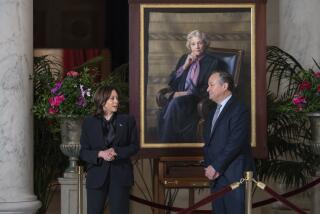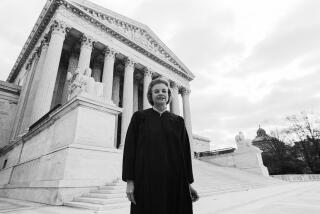Margaret McHugh, 93; Aide to 2 Supreme Court Chief Justices
WASHINGTON — WASHINGTON -- Margaret Krueger McHugh, the personal secretary to Chief Justices Fred Vinson and Earl Warren, who was treasured by her bosses for her firm-handed efficiency and unflagging discretion and who frequently found herself amid events of great moment, has died. She was 93.
McHugh died of congestive heart failure March 28 at the Casey House hospice in Rockville, Md.
She was among the first at the court to greet former California Gov. Warren in 1954 when he began his 16-year career as chief justice, and she was with him when he left, helping the ailing justice compose his memoirs and attending to the estate of the jurist and his wife, Nina.
McHugh would shuffle past Warren in the Supreme Court’s walk-in safe as he was reading the drafts she was typing on the momentous Brown vs. Board of Education decision in 1954, and she wrote the note passed to the chief justice in 1963 to inform him that President Kennedy had been shot in Dallas.
Working at the court from 1946 to 1969, she clipped the wings of generations of young and preening law clerks and kept the chief justice’s work schedule, making sure deadlines were met, opinions were filed and appointments were on time.
“She had to keep us on the mark and wasn’t overly impressed by our credentials,” said Phillip Johnson, a former Warren clerk and now a law professor at UC Berkeley. “But she had her kindly side and loved for us to bring our babies in to be introduced to her and the chief.”
Warren, writing about his six-day workweeks in his posthumously published memoirs, recalled going in on Saturdays. “I did not require my staff to be present, but [she] was always there,” he wrote. “I told her many times that it was not necessary for her to do so.... She was never absent on a business day throughout my 16 years on the court.”
The chief justice never called his secretary by her first name or her family nickname “Peggy.” She was always “McHugh.” She saw Warren for more time than probably anyone else in the building, and her role was more than that of secretary; she was also a confidant.
In his 1997 Warren biography, “Chief Justice,” Ed Cray wrote of how Warren, distraught at the controversy surrounding Justice Abe Fortas and a bribery scandal, confided in McHugh in 1969 after a private meeting with Nixon administration Atty. Gen. John Mitchell. “Why would Fortas accept $20,000 a year? It doesn’t make any sense. He has to go.”
She also was privy to Warren’s thoughts about President Eisenhower and his secretive lobbying of the chief justice in the midst of the debate over the Brown decision that ruled school segregation illegal.
“Dwight Eisenhower was just completely opposed to the segregation decision, and the chief justice knew that,” she recalled in the Cray biography.
On Nov. 22, 1963, she delivered a folded note to a court attendant, who handed it to Warren: “It was reported that the president has been shot while riding in a motorcade in Dallas, Texas.”
Though she was witness to history and granted a few interviews for biographies of Warren, McHugh was a close-mouthed throwback to a generation of Washington major-domos who rarely spoke of what they had seen. Her family said she had turned down lucrative book offers. She kept secret her role in handling the Warren estate.
McHugh was born and raised on a farm in Lincoln Township, Wis. She attended the University of Wisconsin at Madison and graduated with a bachelor’s degree in English in 1936 from George Washington University.
She had moved to Washington in the 1930s and worked as a secretary to Treasury Secretary Henry Morgenthau Jr. during the New Deal era. She continued working in this capacity for his successor, Fred Vinson, and then followed Vinson to the Supreme Court when he was named chief justice in 1946 by President Truman. After Vinson stepped down, Warren retained her because, he wrote, she “knew every facet of staff relationships.”
Although she never talked much about her obvious affection and loyalty for Warren, McHugh did say: “He liked things done right. I liked things done right, so we had no problem there.” Warren died in 1974.
McHugh’s husband, Robert, whom she married in 1936, died in 1989.
She leaves no immediate survivors.
More to Read
Get the L.A. Times Politics newsletter
Deeply reported insights into legislation, politics and policy from Sacramento, Washington and beyond. In your inbox three times per week.
You may occasionally receive promotional content from the Los Angeles Times.









